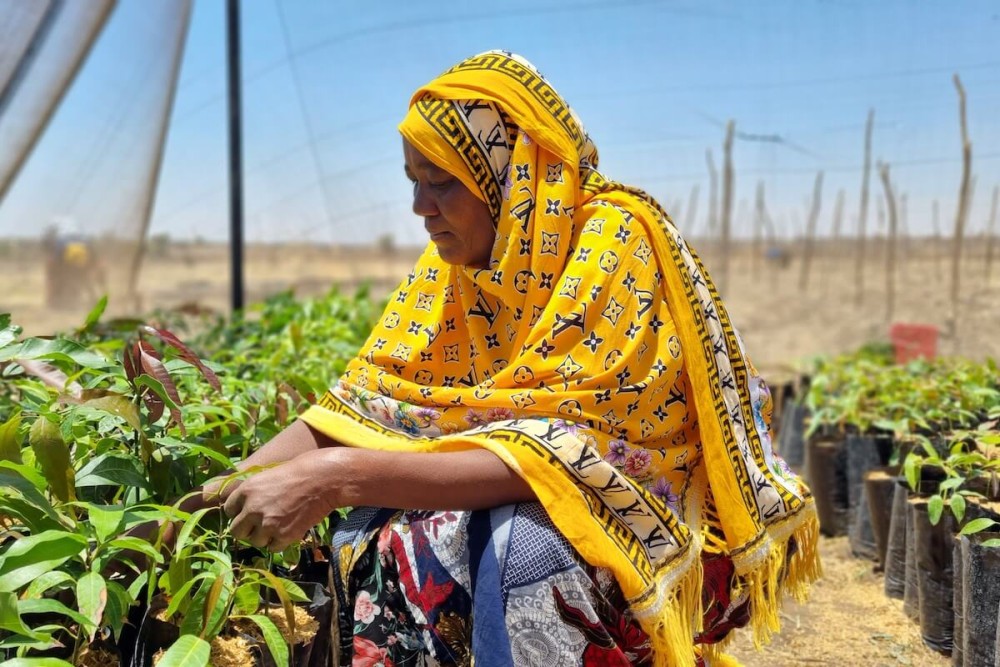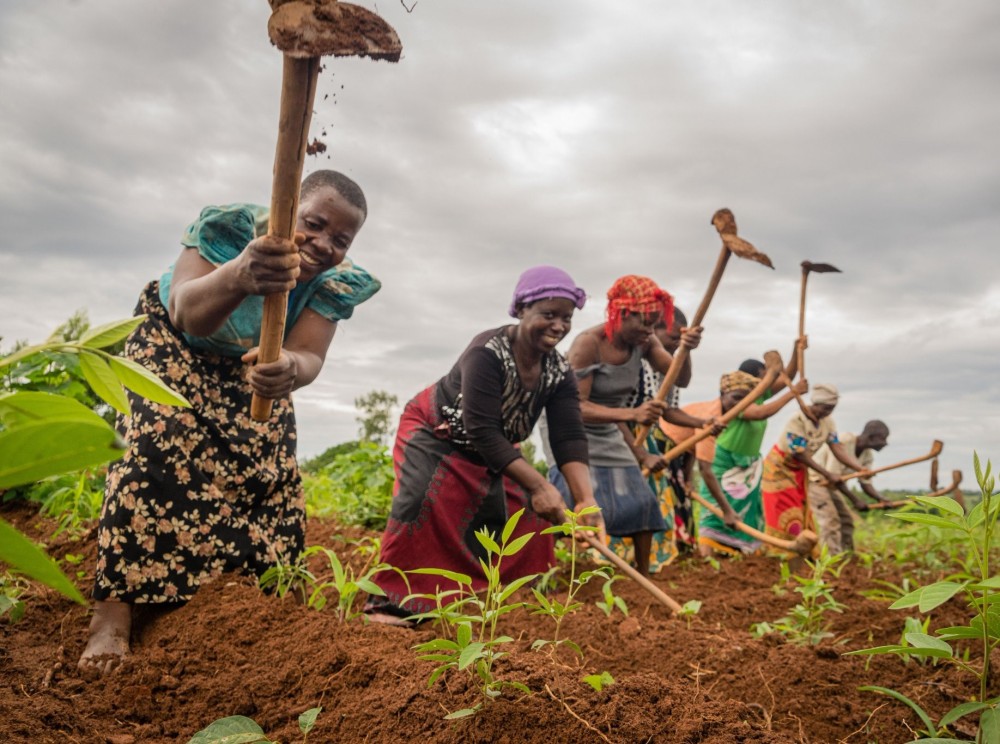The agricultural sector in Tanzania often hailed as the backbone of the nation’s economy, is fueled by the sweat and toil of countless hardworking women, employing about 65% of the country’s labor force and accounting for nearly 25% of the GDP (World Bank, 2022). Women make up over half of this labor force, often laboring under less favorable conditions compared to their male counterparts. oday, we explore into the fertile fields of Tanzanian agriculture, uncovering the challenges faced by women and exploring the transformative solutions that can sow the seeds of empowerment.
Current Situation and Challenges: Sowing the Seeds of Gender Disparities
While women play a significant role in Tanzanian agriculture, gender disparities are evident. Firstly, access to land is a critical factor. In this captivating tableau, women’s hands and hearts intertwine with the soil, but their rights to the land itself are limited. The Tanzania National Bureau of Statistics reveals a staggering truth: women own only a meager 20% of the agricultural land. The distribution is skewed due to a deeply ingrained patriarchy in Tanzanian society, which often relegates women to secondary roles.
Sowing the Seeds of Gender Disparities
Imagine a vast landscape dotted with laborers, their faces etched with determination and resilience.. The Tanzania National Bureau of Statistics reveals a staggering truth: women own only a meager 20% of the agricultural land, an unjust proportion akin to distributing a single slice of pie amongst a ravenous crowd.
When women are technically landowners, they often do not exercise full rights over their property. Studies have found that women’s decision-making power regarding land use is significantly restricted compared to men, which negatively impacts agricultural productivity. Research indicates that closing the gender gap in land ownership could potentially increase agricultural output in Tanzania by 15%.
Nurturing the Seeds of Empowerment
Beyond land, women face an arduous journey when seeking access to financial services. Picture a rickety bridge over a chasm of inequality, where traditional gender roles and socio-cultural norms act as creaking boards, threatening to plunge women into the abyss of credit exclusion. These women, tethered to their plots of potential, often lack the collateral necessary to secure loans, leaving them clutching at wilted dreams. Even when they do receive a loan, it is a mere trickle compared to the torrents bestowed upon their male counterparts.
Enriching the Soil of Knowledge
In the ever-evolving realm of agriculture, knowledge is the nourishing rain that allows the seeds of progress to thrive. Yet, women farmers find themselves parched for information, their crops of innovation stifled by a drought of access. Picture a classroom where only half the students receive lessons, while the others are left in ignorance’s shadow. Equipping women with the latest agricultural techniques and technologies, be it improved farming tools or digital platforms brimming with wisdom, can cultivate a revolution in productivity, turning arid fields into vibrant landscapes of abundance.
In addition, women’s dual roles in society – being responsible for both productive tasks (farming) and reproductive tasks (family care and household chores) – take up significant time, reducing their capacity to engage in income-generating activities or to invest time in learning and adopting new farming techniques. The lack of childcare and eldercare services, and the expectation that women should carry out these tasks, further compounds the issue.

Mariam Ntundu’s Case Study
Mariam Ntungu, a woman farmer from Singida’s Ikungi district in central Tanzania, spent decades cultivating the small piece of land behind her home and had resigned herself to yielding only enough to sustain her family.“If we got lucky, we had a little extra to sell and give our children some meat or eggs that week, but sustaining this didn’t seem possible at the time”.
In the face of these challenges, women from Mariam’s district decided to join forces. They organized themselves into producers groups, pooling their resources to cultivate larger pieces of land and farm sunflowers—the most profitable crop farmed in that region. By selling their crops as a collective, the women have been able to attract larger customers.
Mariam’s story is similar to that of many women farmers in the country, where—although women are the majority of the agricultural labour force—multiple barriers stand in the way of their empowerment.
Differing Viewpoints
There are varying viewpoints on how to tackle these challenges and empower women in Tanzanian agriculture. One perspective emphasizes the need for gender-responsive policies and legislative reforms that address the gender biases in land ownership and access to credit.
Another perspective focuses on the importance of education and capacity building for women farmers. Proponents argue that equipping women with the necessary skills and knowledge can increase their productivity and improve their livelihoods.
Others advocate for the use of technology to alleviate women’s workload and enhance their productivity. They posit that technologies like improved farming tools and digital platforms for agricultural information can significantly empower women farmers.
Based on these differing perspectives, it is apparent that women’s empowerment in Tanzanian agriculture requires a multifaceted approach. In my opinion, gender-responsive policies are crucial. It is critical to address the legislative and cultural barriers preventing women from accessing resources like land and credit. Policies should seek to foster an enabling environment where women can flourish in their agricultural pursuits.
Equally important is investing in women’s education and training. Tailored capacity-building programs can enhance women’s agricultural skills and knowledge, boosting their productivity. Such programs should be sensitive to women’s time constraints and should ideally incorporate flexible training schedules and locations.
Technological interventions can be transformative. Providing women with access to technologies that reduce their workload or enhance their productivity can empower them. Digital platforms can be particularly beneficial in disseminating agricultural information and connecting women farmers to markets.
To put it concisely, empowering women in Tanzanian agriculture is a task of both national and global significance. It bears on issues of food security, poverty reduction, and economic development. By hindering women’s full participation in agriculture, gender disparities also perpetuate income inequality and food insecurity. They impact the country’s overall economic growth as well since agriculture accounts for a significant portion of Tanzania’s GDP. Despite the challenges, there are also immense opportunities for change and progress. Through a combination of gender-responsive policies, education, and technological interventions, we can begin to close the gender gap in Tanzanian agriculture. While this is no small task, it is a necessary and achievable one. By prioritizing women’s empowerment, we can secure not only a more equitable present but also a more prosperous future for Tanzania’s agricultural sector.
Read here: Agricultural articles.

